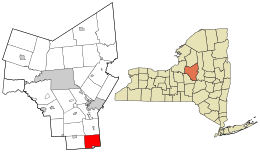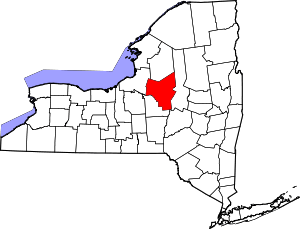Bridgewater, New York
| Bridgewater | |
| Town | |
| Country | United States |
|---|---|
| State | New York |
| County | Oneida |
| Coordinates | 42°53′N 75°15′W / 42.883°N 75.250°WCoordinates: 42°53′N 75°15′W / 42.883°N 75.250°W |
| Area | 23.9 sq mi (61.9 km2) |
| Population | 1,522 (2010) |
| Density | 63.7/sq mi (24.6/km2) |
| Town Supervisor | Dale DeKing (R) |
| - Town Council | |
| Timezone | EST (UTC-5) |
| - summer (DST) | EDT (UTC-4) |
 Location in Oneida County and the state of New York.
| |
Bridgewater is a town in Oneida County, New York, USA. The population was 1,522 at the 2010 census.
The Town of Bridgewater in on the south border of the county. The town has a former village called Bridgewater near the south town line. The town and hamlet were named after the Duke of Bridgewater.
History
The first settlement occurred around 1788. The Town of Bridgewater was formed from the Town of Sangerfield in 1797.
Geography
According to the United States Census Bureau, the town has a total area of 23.9 square miles (61.8 km²), all of it land. US 20 crosses the south part of the town where it intersects NY 8.
The south town line is the border of Madison County and Otsego County. The east town line is the border of Herkimer County.
Demographics
| Historical population | |||
|---|---|---|---|
| Census | Pop. | %± | |
| 1800 | 1,061 | — | |
| 1810 | 1,170 | 10.3% | |
| 1820 | 1,533 | 31.0% | |
| 1830 | 1,608 | 4.9% | |
| 1840 | 1,418 | −11.8% | |
| 1850 | 1,308 | −7.8% | |
| 1860 | 1,261 | −3.6% | |
| 1870 | 1,258 | −0.2% | |
| 1880 | 1,218 | −3.2% | |
| 1890 | 1,073 | −11.9% | |
| 1900 | 931 | −13.2% | |
| 1910 | 832 | −10.6% | |
| 1920 | 746 | −10.3% | |
| 1930 | 730 | −2.1% | |
| 1940 | 743 | 1.8% | |
| 1950 | 806 | 8.5% | |
| 1960 | 966 | 19.9% | |
| 1970 | 1,251 | 29.5% | |
| 1980 | 1,455 | 16.3% | |
| 1990 | 1,591 | 9.3% | |
| 2000 | 1,671 | 5.0% | |
| 2010 | 1,522 | −8.9% | |
| Est. 2014 | 1,500 | [1] | −1.4% |
As of the census[3] of 2000, there were 1,671 people, 596 households, and 454 families residing in the town. The population density was 70.1 people per square mile (27.1/km²). There were 639 housing units at an average density of 26.8 per square mile (10.3/km²). The racial makeup of the town was 97.31% White, 0.78% Black or African American, 0.78% Asian, 0.18% from other races, and 0.96% from two or more races. Hispanic or Latino of any race were 1.02% of the population.
There were 596 households out of which 42.1% had children under the age of 18 living with them, 57.0% were married couples living together, 10.7% had a female householder with no husband present, and 23.8% were non-families. 19.5% of all households were made up of individuals and 7.2% had someone living alone who was 65 years of age or older. The average household size was 2.80 and the average family size was 3.12.
In the town the population was spread out with 31.1% under the age of 18, 7.8% from 18 to 24, 31.7% from 25 to 44, 21.2% from 45 to 64, and 8.2% who were 65 years of age or older. The median age was 34 years. For every 100 females there were 104.5 males. For every 100 females age 18 and over, there were 99.8 males.
The median income for a household in the town was $30,724, and the median income for a family was $33,750. Males had a median income of $29,074 versus $20,956 for females. The per capita income for the town was $13,875. About 7.9% of families and 10.1% of the population were below the poverty line, including 10.5% of those under age 18 and 9.1% of those age 65 or over.
Communities and locations in the Town of Bridgewater
- Babcock Hill – A hamlet in the northeast part of the town.
- Bridgewater – A hamlet on US Route 20 near the south town line. It was an incorporated village, but dissolved in 2014.
- Hobin Corners – A hamlet near the west town line on US Route 20.
- Mapledale – A hamlet near the center of the town.
- North Bridgewater – A hamlet in the northern part of the town on NY Route 8.
- Tassel Hill – Highest point in Oneida County. Located in the southern part of the town, on the borders of Marshall, Paris, and Sangerfield, townships.
References
- ↑ "Annual Estimates of the Resident Population for Incorporated Places: April 1, 2010 to July 1, 2014". Retrieved June 4, 2015.
- ↑ "Census of Population and Housing". Census.gov. Archived from the original on May 11, 2015. Retrieved June 4, 2015.
- ↑ "American FactFinder". United States Census Bureau. Archived from the original on 2013-09-11. Retrieved 2008-01-31.
